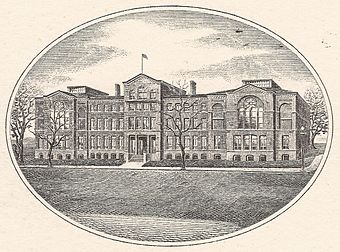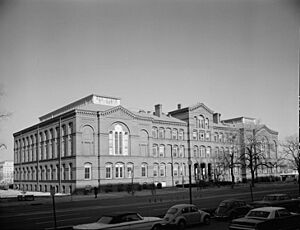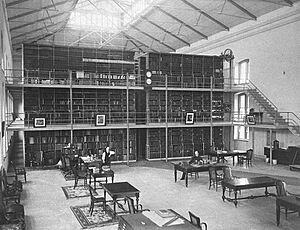Army Medical Museum and Library facts for kids
|
Army Medical Museum and Library
|
|
 |
|
| Lua error in Module:Location_map at line 420: attempt to index field 'wikibase' (a nil value). | |
| Location | Demolished; formerly, South B Street [now Independence Avenue] and 7th Street, SW, Washington, D.C.) |
|---|---|
| Built | 1887 |
| Architect | Adolf Cluss |
| Architectural style | Romanesque |
| NRHP reference No. | 66000854 |
Quick facts for kids Significant dates |
|
| Added to NRHP | October 15, 1966 |
| Designated NHL | January 12, 1965 |
The Army Medical Museum and Library (AMML) was a large brick building in Washington, D.C.. It was built in 1887 near the National Mall. This building was very important for medical history. It was recognized as a special historic place in 1965. Sadly, the building was taken down in 1969. Its amazing collections were then moved to other places.
The Old Building: 'Old Red'
The AMML building was designed by a German-born architect named Adolf Cluss. He designed it to hold several important things. These included the Army Medical Museum and the Library of the Surgeon General's Office. It also kept many of the Army's medical records. From 1893 to 1910, it even housed the Army Medical School.
People sometimes called the old building "Old Red." Another nickname was "The Old Pickle Factory." The AMML stayed on the National Mall until the 1960s. Then, the Museum and Library moved to new locations. The old building was torn down in 1969. A new museum, the Hirshhorn Museum and Sculpture Garden, was built in its place.
What Was Inside? The Collections
The collections at the AMML started during the American Civil War in 1862. The government wanted to gather items about treating wounded and sick soldiers. At first, the collection focused on diseases common in the military. These diseases caused many deaths during the war.
Over the next 20 years, the collection grew. It included many different medical samples. These samples helped military medical researchers learn more. In 1888, the collection was opened to civilian doctors too. This meant doctors who were not in the military could also use it for research.
Before the AMML building was finished in 1887, the collection was kept in different places. One of these places was Ford's Theatre. The collection stayed in the AMML building until October 1968. After that, it was split up and moved. Today, the main part of this collection is at the National Museum of Health and Medicine. This museum is now in Silver Spring, Maryland.
Where Are the Collections Now?
The important collections and institutions that were once part of the AMML have new homes:
- The Armed Forces Institute of Pathology (AFIP) was on the campus of Walter Reed Army Medical Center. It closed down in 2011.
- The National Museum of Health and Medicine is now in Silver Spring, Maryland. It moved there in 2011. It is part of the U.S. Army Medical Research and Materiel Command.
- The Library of the Surgeon General's Office changed its name many times. It became the Army Medical Library and then the Armed Forces Medical Library. In 1956, it became the National Library of Medicine (NLM). The NLM moved to Bethesda, Maryland, in 1961.
 | Selma Burke |
 | Pauline Powell Burns |
 | Frederick J. Brown |
 | Robert Blackburn |



